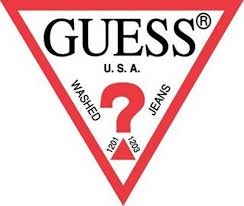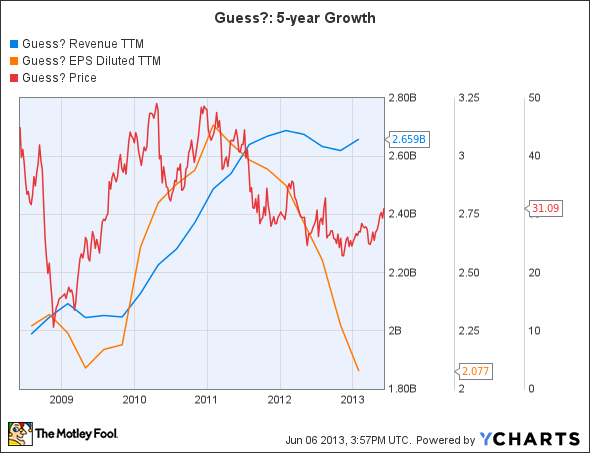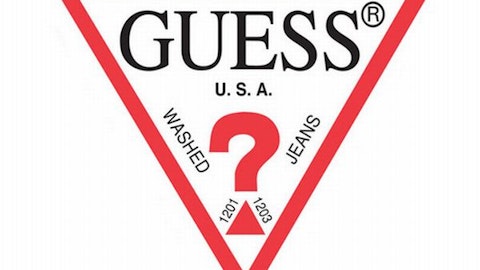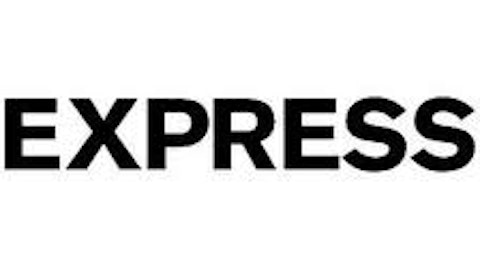
Today, I would like to focus on three other stocks in the apparel and accessories industry — Guess?, Inc. (NYSE:GES), Express, Inc. (NYSE:EXPR), and Ralph Lauren Corp (NYSE:RL). These three companies all recently rallied after reporting better-than-expected quarterly earnings — a stark, refreshing contrast to the trials and tribulations facing the troubled teen apparel sector.
Guess? fails to impress
Shares of apparel retailer Guess?, Inc. (NYSE:GES) recently surged, after the Los Angeles-based company posted better-than-expected first-quarter earnings followed by solid guidance for the rest of the year. The company reported adjusted earnings of $0.14 per share, down from $0.30 in the prior year quarter. Revenue also slid 5.2% year-on-year to $548.9 million. These results topped the consensus estimate for profit, but missed on revenue growth. Nonetheless, the stock soared 8% after it reported earnings on May 30. Was this optimism really justified?
Not really. Although Guess?, Inc. (NYSE:GES) reported impressive 10% year-on-year sales growth in Asia, its smallest market, sales in North America and Europe declined 5% and 13%, respectively. To make matters worse, same-store sales in North America, its largest market, slumped 9.8%. A 30% increase in Latin American sales helped offset some of those losses, but overall, its global sales growth was a mixed bag. Operating margin also fell from 6.8% to 2.5%, which the company attributed to same-store sales declines, higher markdowns in North America, and a weakening wholesale business in Europe.
Despite these sales and margin declines, Guess?, Inc. (NYSE:GES) expects to generate $620 million to $635 million in full year revenue, topping the consensus estimate of $618 million. Its adjusted full-year earnings are expected to come in between $0.34 and $0.38 a share, in line with the consensus estimate of $0.36 per share.
Last quarter, CEO Paul Marciano outlined a “three–point strategy” to generate more sales growth in 2013 — more denim products, higher visibility of its iconic jeans, and a shortening of the supply chain calendar. These changes are reactive strategies to streamline and speed up its operations, which rotate fashions at a slower rate than competitors such as Forever 21 and H&M.
While streamlining its efforts is a promising strategy, I’m not convinced that Guess?, Inc. (NYSE:GES) is a solid investment. I would like to see more improvement in its North American sales and beefier operating margins before I believe that the company can really turn its business around.
Express shows promise
Express, Inc. (NYSE:EXPR), which sells low to mid-priced apparel for young men and women, was once part of Limited Brands, but was sold to private equity firm Golden Gate Capital in 2007. The company was taken public in 2010, and has since risen 23% from its IPO price of $17. While that long-term gain isn’t terribly impressive, Express, Inc. (NYSE:EXPR)’ recently-reported first-quarter earnings attracted a lot of attention, which boosted shares over 10% on May 30.
Unlike Guess?, I believe that the optimism for Express, Inc. (NYSE:EXPR) was justified. Earnings per share came in at $0.38, a 23% year-on-year decline which nonetheless topped the consensus estimate by $0.02. Revenue rose 2.5% to $508.5 million, topping analyst expectations of $498 million. Although same-store sales came in flat, it was far better than the negative same-store sales that most analysts had forecast.
Meanwhile, Express, Inc. (NYSE:EXPR) raised its full-year same-store sales guidance to “low to mid single digits,” up from simply “low single digits.” It also raised its full-year earnings guidance to a range between $1.48 to $1.58 a share, which exceeded analyst expectations.
Despite its smaller brick-and-mortar footprint of 600 stores (compared to Guess?’ 1,690 global stores), Express managed to grow its e-commerce sales by 48% during the quarter, up from 28% growth in the previous year. E-commerce now accounts for 14% of Express’ top line, generating $70.7 million in sales.
What I like about Express, Inc. (NYSE:EXPR) is its smaller size, its fairly cheap valuation (11.7 times forward earnings), its stable same-store sales growth, and its strong e-commerce growth. In addition, the company only operates in the United States, which insulates it from unfavorable currency impacts and regional slowdowns.
Ralph Lauren is a reliable giant
Compared to Guess?, Inc. (NYSE:GES) and Express, Ralph Lauren Corp (NYSE:RL) is a giant. With a market cap of $15.7 billion, it is one of the largest publicly traded apparel retailers in the world. Yet, it’s that size that makes it one of the safest investments in the retail apparel sector. The stock has risen nearly 20% over the past twelve months on the strength of its iconic Polo Ralph Lauren Corp (NYSE:RL) brand.

During the fourth quarter, Ralph Lauren’s bottom line rose 42.4% from the prior year quarter to $1.41 per share, topping the consensus estimate by $0.11. Revenue also grew 1% to $1.64 billion, which slightly missed analyst expectations.
Investors should notice that even though Ralph Lauren Corp (NYSE:RL)’s top line is rising very slowly, its bottom line is growing at a much faster rate. This indicates that the company’s operating margin, which rose from 8.4% to 11.1%, is steadily climbing, and its expenses are declining at a healthy rate. Its retail same-store sales also rose 4% on a constant currency basis.
Ralph Lauren’s strength comes from its earnings growth. While other apparel retailers have recently reported rising revenue dragged down by flat to negative earnings, Ralph Lauren keeps piling on the profits. In fact, over the past ten years, Ralph Lauren Corp (NYSE:RL)’s earnings have grown at a CAGR (compounded annual growth rate) of 16.4%, making for a perfect example of a slow and steady company that wins the race while its competitors simply burn out, as seen in the following chart.

The Foolish fundamentals
Last but not least, let’s compare the fundamentals of these three apparel retailers.
Forward P/E | Price to Sales (ttm) | Return on Equity | Debt to Equity | Profit Margin | Qty. Earnings Growth (y-o-y) | Qty. Revenue Growth (y-o-y) | |
Guess? | 14.60 | 1.00 | 14.52% | 0.90 | 6.16% | -62.80% | -5.20% |
Express | 11.71 | 0.82 | 35.32% | 48.80 | 6.00% | -22.90% | 2.50% |
Ralph Lauren | 17.34 | 2.27 | 20.17% | 8.06 | 10.80% | 34.70% | 1.30% |
Advantage | Express | Express | Express | Guess? | Ralph Lauren | Ralph Lauren | Express |
Source: Yahoo Finance, 6/6/2013
It’s clear that Guess?, Inc. (NYSE:GES) has some severe top and bottom line growth issues, but it has much lower debt than either Express or Ralph Lauren Corp (NYSE:RL). Meanwhile, Express, Inc. (NYSE:EXPR) can be considered the cheapest stock based on P/E and P/S valuations, as well as from past stock performance. Lastly, Ralph Lauren has the most robust margins and bottom line growth, but its stock appears to be trading at a slight premium to its peers.
In closing, I think conservative investors should stick with Ralph Lauren, and more speculative ones should go with Express. As for Guess?, I would simply keep an eye on the company to see if it can fulfill its promises of streamlined operations and a turnaround in its critical North American market.
The article Which of These 3 Retailers Should You Buy? originally appeared on Fool.com and is written by Leo Sun.
Leo Sun has no position in any stocks mentioned. The Motley Fool recommends Guess?. The Motley Fool owns shares of Guess?. Leo is a member of The Motley Fool Blog Network — entries represent the personal opinion of the blogger and are not formally edited.
Copyright © 1995 – 2013 The Motley Fool, LLC. All rights reserved. The Motley Fool has a disclosure policy.







